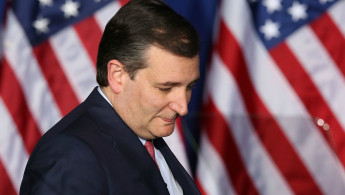Trump the 'presumptive' Republican nominee after Cruz drops out
Texas senator Ted Cruz ended his presidential campaign on Tuesday, eliminating the biggest impediment to Donald Trump's march to the Republican nomination.
The conservative tea party firebrand who cast himself as the only viable alternative to Trump announced his exit after a stinging defeat in Indiana's Republican primary.
"It appears that path has been foreclosed," Cruz told supporters in Indianapolis.
"Together, we left it all on the field of Indiana. We gave it everything we've got, but the voters chose another path, and so with a heavy heart but with boundless optimism for the long-term future of our nation, we are suspending our campaign."
Cruz had already been mathematically eliminated from clinching the delegate majority in the state-by-state primary process, but hoped to force a contested national convention in July. That possibility ends Tuesday with the Texas senator's announcement.
Cruz argued he was the only true conservative in the race, building on his reputation in the Senate where he clashed both with Democrats and members of his own party over his ideological stubbornness.
Cruz railed against what he called the "Washington cartel," trying to appeal to an electorate that is craving political outsiders.
But he ultimately couldn't compete with Trump's appeal among white, working class voters who were drawn to the billionaire's outlandish approach to politics.
His departure leaves the low-polling Ohio Governor John Kasich as Trump's only challenger for the nomination - making it a virtual certainty that the billionaire will be the Republican party's presidential nominee.
The top echelon of the Republican establishment said as much minutes after Cruz capitulated, with Republican Party chief Reince Priebus declaring Trump the "presumptive" nominee.
Twitter Post
|
Democratic front-runner Hillary Clinton meanwhile suffered an upset in Indiana as her rival Bernie Sanders mounted a come-from-behind victory, denying the former secretary of state a feather in her cap as she seeks their party's presidential nomination.
Sanders, a self-declared democratic socialist, beat Clinton by 53.2 percent to 46.8 percent with about three quarters of precincts reporting - although Clinton remained well ahead in the overall delegate battle for the nomination.
Sanders told the Associated Press that his Tuesday win was a "great upset victory" against Clinton and that he expects "more victories in the weeks to come".
"The Clinton campaign thinks this campaign is over. They're wrong," said the Vermont senator.
He said he has an "uphill climb" to the nomination but he's "in this campaign to win and we are going to fight until the last vote is cast."





 Follow the Middle East's top stories in English at The New Arab on Google News
Follow the Middle East's top stories in English at The New Arab on Google News
![The UAE is widely suspected of arming the RSF militia [Getty]](/sites/default/files/styles/image_330x185/public/2024-11/GettyImages-472529908.jpg?h=69f2b9d0&itok=Yauw3YTG)
![Netanyahu furiously denounced the ICC [Getty]](/sites/default/files/styles/image_330x185/public/2024-11/GettyImages-2169352575.jpg?h=199d8c1f&itok=-vRiruf5)
![Both Hamas and the Palestinian Authority welcomed the ICC arrest warrants [Getty]](/sites/default/files/styles/image_330x185/public/2024-11/GettyImages-2178351173.jpg?h=199d8c1f&itok=TV858iVg)